#all throughout history
Note
I've been thinking, there are multiple ways in which the Choices fandom seems to not give a damn about wlw players and I think the gender coding issues is one of them.
When I see gender coding discussions on Reddit, most of the time it's trivial bullshit like male MC players complaining because their male MC stayed in feminine behaviors/roles like the female MC got put into. Male MC sat in the LI's lap, male MC walked down the aisle, male MC was saved by the LI, male MC acted gushy/"princessy", boo fucking hoo. Most of this is just lazy coding in general.
Rarely ever on that sub do I hear about the actual coding errors that straight up don't match with the chosen MC gender like "I now pronounce you husband and wife" for Hana and MC, male CA MC being called "thee my daughter" during the promposal, female Sam being called "dad", Paolo's "women don't belong in the workplace" bullshit despite that his daughter is marrying a female CEO, outfit descriptions that don't match the male AME MC's outfits, the fucking description of Surrender 2 initially referring to Pat as "husband".
And notice how majority of the actual coding errors take place in wlw routes? But they rarely get talked about. Deadass I've seen way more people complain about male MC getting walked down the aisle in AME than I have about MC and Hana getting pronounced "husband and wife".
When I really think about it, I'm very convinced that a lot of people believe that the female players (both wlm and wlw, lbr the wlm routes have their own different set of issues as well) "don't have it as bad" because every book in Choices has female MC options, like "well you're the ones PB is catering to so you can't possibly be having any real problems with the romance routes".
And don't get me wrong, I 100% sympathize with the people who want more GOC MCs. I'm very pro-GOC myself . It's clear that PB often does not care about their male MC players, but I am so tired of seeing that in regards to male MCs acting super-feminine as if wlw routes don't often have even more terrible coding and wlm routes don't constantly rely on pandering and gender stereotypes. If that makes sense.
I 100% agree with you! I think the reason why wlw issues with PB's books are downplayed so much on here and other sites like reddit, Twitter and so on is because gay guys and women who play as a male mc to romance the male LIs outnumber women who only romance the female LIs.
Also, I've noticed over the years of talking and interacting with other lesbians on tumblr that it seems like a lot of us are being bullied, harassed and chased off of the other sites and they're starting to do the same here on tumblr now. I just feel that there's a dwindling amount of lesbians in the choices fandom lately.
But I totally understand how tiring the coding is for wlw, everytime I make a post about it, there's always someone trying to speak over me in the comment section about how bad the coding is for mlm players. Like I get it lol! PB is lazy! But let me have my moment of ranting! Stop trying to silence us by telling us that we have it loads better! Plus, if you come onto a lesbian playchoices blog and try to talk over them about other issues, it's a lot like walking into a save the rainforest committee and asking, "well what about all the pollution in the oceans? Why do you not care about the oceans??" Like yes, there's a lot of stuff PB gets wrong with their obvious catering to wlm crowd and I feel for the male readers but for them to say that PB caters to lesbians JUST as much as wlm?? Lol nah they don't
#Misogyny runs rampant in the fandom too#All throughout history#The male anguish has overshadowed women's#We're suppose to just shut up and be grateful#alien answers#anon ask#Imo the homophobes#Have subtly pit the mlm against the wlw in the choices fandom#And most ppl don't see it
7 notes
·
View notes
Text
south africa was banned in the olympics in 1964, 1968, 1972, 1976, 1980, 1984, 1988 & 1992. a total of 8 times. for 28 years they didn't set foot in the olympics. you know why? apartheid. apparently the olympics disagreed with the apartheid regime in south africa. russia & belarus aren't allowed to take part in the olympics this year. you know why? because of their involvement in the war in ukraine. several countries throughout history haven't been allowed to participate in the olympics because of various reason from their involvement in war to human rights abuses. now if the olympics aren't blind to all that... why in the world are they blind to what israel has been doing to gaza for the past 10 months? why is a genocidal apartheid nation allowed to participate in the olympics when any other country in its place would've been banned?
#tbh the US should've also been banned for all their various human rights abuses throughout history#but isn't that the same issue? why do the US & israel get passes to behave this way when other countries are held to a particular standard?#olympics#2024 olympics#paris olympics#israel#palestine#keshika rambles
42K notes
·
View notes
Text
Yes, trans men and mascs have historically been subjected to less public violence and ridicule than trans women and fems. Is having privilege really the only reason you can think of for that? Have you considered that they had less ability to be publicly visible in the first place? Please remember that the lack of autonomy women have historically been granted also applies to transmascs. They would have been considered the property of men. Spousal rape wasn't illegal everywhere in my country until 1993. How easy do you think it would be for forcibly impregnated transmascs to transition? For abused transmascs in general? Do you think they were all even allowed out of the house often without a man? There are so many stories of transmascs being forcibly institutionalized for being trans. Is that situation and otherwise being quietly abused and erased really so much better than hypervisibility?
#I guarantee you there are so so so many trans men and mascs throughout history that died being known as women.#it doesn't mean they weren't dying & going through other horrible shit just because we haven't heard about all of it#notice how now that women have more rights in society and are allowed to be more visible transmascs are getting more negative attention#I mean don't get me wrong most of that attention is still misogyny but now that we have greater ability to transition it looks different#transandrophobia#transmasc#transfeminism#intracommunity issues tag#SA tw#abuse tw#forced pregnancy tw#queue#mine#before anyone says anything this is NOT saying transfems have gendered privilege over transmascs or they've never been treated like propert#it's just different being treated like your main purpose is to make men happy and have their babies since the day you're born
993 notes
·
View notes
Text
leftists have created for themselves a situation where they have to either be islamophobic or antisemitc, because to them anything even mildly criticising islam or muslims and not treating them as a pure, primitive and peaceful culture is islamophobic. acknowledging jewish oppression under muslim rule or our indigeneity to the levant interferes with their narrative of the perfect noble savages, so now they have to choose between supporting jews or continuing to be unconditionally islamophilic. guess what they chose.
#their utter refusal to acknowledge history lest they be islamophobic is infuriating#guys literally every major religion has done fucked up things throughout history. even judaism actually.#here i am as a jew admitting this because it's not fucking antisemitc to do so.#it genuinely feels like everyone is afraid to criticise anything muslim even in the slightest#including actual fucking terrorist organisations. saying there are muslim terrorists is not saying all of them are ffs.#leftist antisemitism#leftist islamophilia#antisemitism#islamophilia#hila has spoken
560 notes
·
View notes
Text
I’m sorry but my Mother Mary, Terror of Demons, Queen of Heaven, Star of the Sea, was not “REDUCED to motherhood” by God
#one of my posts broke catholic containment a bit#absolute brain dead take spotted#also like??#what do you think women generally did anyway throughout all of history?#they generally didn’t have a ton of options especially poor women of an oppressed class#you’re acting as if she had some promising aspirations as a CEO or something that God cruelly ripped away for no reason#catholic#ugh
450 notes
·
View notes
Text
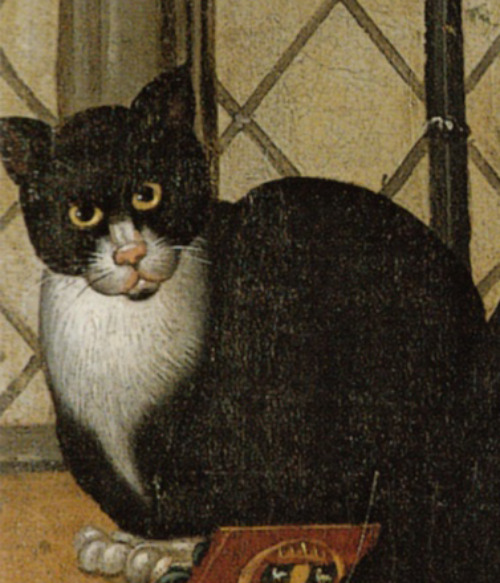
Trixie the cat from the portrait of Henry Wriothesley, 3rd Earl of Southampton. 1603. Attributed to John de Critz. Source
@catsofyore
#cat#cats#kitty#kitten#kittens#kitties#cats of yore#catsofyore#cats of history#catsofhistory#historical cats#17th century#17th century art#cats throughout history#cats in history#i love cats#i love all cats#hairy babies#fluffy angels
464 notes
·
View notes
Text
[Meanwhile Back on Earth]
Crowley, drunk : I mean, I thought I did everything right. He was certainly giving hints yesterday but if i wasn't distracted by the demons trying to fucking attack the bookshop I would've been more receptive. And why did he leave for Heaven when he knows he can't the change its's bureaucracy! And to leave me here and say he forgives me like the bastard he is well I ought to....I ought to...What should I do?
The Ducks: ..quack?
Crowley, still drunk: THAT'S WHAT I'M SAYING
#yes the ducks are certified therapists#they've been with the ineffable husbands all throughout history#they are the most competent characters istg#good omens ducks#good omens 2#good omens#good omens season 2#incorrect good omens#good omens spoilers#neil gaiman#incorrect quotes#ineffable husbands#aziracrow#ineffable partners#aziraphale#anthony j crowley#david tennant#michael sheen#incorrect good omens quotes#ineffable idiots#ineffable divorce
790 notes
·
View notes
Text
True knowledge exists in knowing you know nothing || Dr. Ratio & Socrates
Okay, I legitimately laughed out loud writing that title, but listen. LISTEN.
Ratio's inspirations derive from many sources; from referencing Archimedes's brain-blast in the tub, to being doomed to have his head bonked by Newton's apple ad infinitum in his idle animation, to his ultimate line ('esse est percipi' / 'to be is to be perceived') a direct quote from Berkeley on Idealism - it's apparent that his design nods towards scholars across time periods rather than being a direct parallel to a singular academic.
Nevertheless, just for fun, I've been rotating Ratio and ancient greek philosophers around in my head and have had a great time chewing over how parallels Socrates in particular. I am in no way saying that Hoyo even thought about Socrates while they were designing Ratio, but I thought I'd share my thoughts. I think there are some worthwhile parallels to be drawn that touch on all aspects of Ratio's own philosophy regarding ignorance, the value of knowledge, and his deep appreciation of life. So, let's get into it.
Ratio is interested in humanity and curing 'ill minds with knowledge', that 'to turn a blind eye to the folly of others is not an etiquette, but a wicked worldly practice.' Ignorance is a disease - this is a concept that can be viewed through a Socratic lens. Socrates believed that that virtue and knowledge were impossible to separate from one another, and that virtue could be developed through acquiring knowledge and insight. If knowledge is virtue, then ignorance is vice. In Socrates's mind, no one would rationally choose to do something bad. People might choose to do bad things, but this is rooted in their own perception of the world - as in, someone would only choose to do something bad (for the world, or for themselves) because they believed (erroneously) that it was the right or good thing to do. To Socrates, the cure to this was knowledge: 'There are two kinds of disease of the soul, vice and ignorance.' & 'What does most harm in the world is not sinfulness but ignorance'.
To Ratio, 'If ignorance is an ailment, it is the duty of the scholars to weed it out and heal the universe'. He views his own ignorance as 'filth' that must be cleansed through methods such as reading. He also views knowledge as a method for humans to overcome their problems - 'Another day has passed. If your problem still hasn't been solved, is it possible the problem is you?' & 'You look distressed. Is something troubling you? if so, you can figure it out for yourself.' These statements sound harsh, but they also clue us into Ratio's philosophy - that through self-examination and improvement, one can overcome one's ailments.
Socrates was also known for being a trouble-maker, he was abrupt and tactless and did not care for someone's social standing nor decorum. He was also known for using what is now called the Socratic method, asking a series of questions that ultimately seek to show contradictions in the beliefs of those who posed them, and to move systematically towards a hypothesis free from contradiction. Socrates rarely made assertions himself - after all, he had no wisdom of his own. But he could interrogate others in order to expose their own foibles, much to the embarrassment and annoyance of those around him. He was once described as a 'gnat' chewing on the 'lazy horse of Athens', causing it to wake up and spring to life due to his persistent gnawing and prodding. Ratio also employs the Socratic method - 'I'm asking questions' - and also adopts sophist tactics such as playing devil's advocate and taking opposing sides (with both himself as seen a story quest, and with others as we see with his texts urging us to take up a side so he might debate us). Through questioning and interrogation, upsetting what we consider social convention and norms, we can dispel contradictions and thereby come closer to some form of truth.
To add to this - as highlighted in the replies below - Ratio’s skill ‘intellectual midwifery’ is a reference to the Socratic method. The idea being that Socrates helped those around him give birth to the knowledge that was already within them, rather than treating his students minds as empty vessels for him to fill with his own answers. Again this is beautifully echoed in Ratio - he doesn’t want to tell you how to live your life, he wants you to work out for yourself what it is you need, thus empowering oneself through self-examination and questioning.
Socrates did not believe in writing anything down. He believed that face-to-face communication was a far more effective way of communicating knowledge - which means, unfortunately, what we know of Socrates is primarily derived from secondary sources. Much of what we know about him today comes from Plato's dialogues, and Plato was known for liberally exercising artistic license.
Although Ratio is not dead, I find it interesting that his character story is told exclusively through secondary sources. To quote - '…There are no less than eight documentaries detailing his legendary exploits, and over a dozen memoirs about him. However, despite the plethora of commentaries, none of them seems to provide a compelling perspective.' It's as though there are no surviving fragments penned by Ratio's hand and all we have to go on is through the lenses of other people. This challenges us, perhaps, to try to think about our own interpretation of Ratio since secondary sources cannot be taken as a wholly unbiased account - and once again employing the Socratic method and empowering the reader to come to their own interpretation.
While Socrates left no writing behind, he was interested in spreading knowledge. Socrates spent most of his life in Athens, a city that was, during his lifetime (~470-399 BC), a hotpot of scholars, wisemen and philosophers. Athena, the Greek god of wisdom, was named after the city - her symbol the owl that is also appropriately perched on Ratio’s shoulder. Also in Athens at this time where the sophists. The sophists were a class of intellectuals who were known to teach courses in various subjects - but often for a high fee, and generally centred around the idea that persuasion and the use of knowledge as a tool was more important than wisdom or truth itself. There's some debate about whether Socrates could be characterised as a sophist himself, but, crucially, he is characterised as refusing to take payment for his teachings. He was born a plebeian (perhaps you might describe it as a mundane background.) He was known to dress in rags and go barefoot, speaking to and (often antagonising) people from all walks of life, preferring the marketplace as a center of debate than palaces or courtrooms. I can't help but think of the sophists as similar to the genius society (or at least Ratio's depiction of them in contrast to himself), cooped up in ivory towers and gatekeeping knowledge to the most privileged. He doubts if Herta's talent is always helpful to others, he compares Screwllum to a 'monarch'. Then again, the sophists may in fact be a bit of a parallel to the Intelligentsia Guild - from Ratio, 'when someone is willing to listen to knowledge that is being disseminated and circulated, a price is created'.
Socrates (or at least the Platonic depiction of Socrates) was at one time declared the wisest man in Athens by the Oracle of Delphi. Socrates balks at this assertion - how can he possibly be the wisest man in Athens when he in fact knows nothing at all? This was not a claim made of modesty - he truly believed that he had no wisdom, that he was unsure what 'wisdom' itself even was. Ultimately, Socrates concludes that the only way that the Oracle could be correct is that by actually acknowledging that he knows nothing he paradoxically is the wisest man in Athens. All wisdom, therefore, is rooted in wondering, with wondering only possible if one is open to admitting one's own ignorance.
What I love about all of this in relation to Ratio is that Ratio styles himself as a mundanite. The Intelligensia Guild advocates that 'all knowledge must be circulated like currency' and accepts 'all beings… who seek to learn'. Ratio has no time for the satisfied self-styling of intellectualism, he himself states that 'to speak knowledge, we must first make people realise their own folly.' No one is above criticism in this regard, even himself - again, to quote 'Whenever someone agrees with me, I feel like I must be wrong.' Again, I feel as though he would resonate with Socrates here: 'Smart people learn from everything and everyone, average people from their experiences, and stupid people already have all the answers'. With Aventurine, he is quick to mock his appearance as over-the-top and vapid - once again making it clear his distate for vanity and hollow displays of showiness (albeit he may have been acting for Sunday's sake here. Also, no comment about this coming from a man who runs around in a toga, lmao)
Equally, with Aventurine, it is clear that Ratio is willing to learn from him - he apologises when he offends, he abhors his methodology and yet he still relies upon it and trusts in Aventurine's plan, he is drawn to him in some ways precisely because he is so different to himself. Aventurine (at least styles himself) as impulsive to Ratio's slow and steady methodology, Aventurine whose learning has been entirely self-made vs Ratio who has spent his life in classrooms, Ratio who scoffs at Aventurine's favourite games of chance yet adds slot machines to his simulated universe.
And to Socrates, the experience of aporia – in all of its discomfort and disruption – is the very catalyst of wonder, and that wonder was not just the root of wisdom but also the way to live a good and happy life. There is something beautiful in this to me, and this extends to Ratio. Ratio fundamentally cares about life. For all his brashness, his lashing out against 'idiots', his harsh demeanour - he wants people to live good lives, he wants to contribute to the good of humanity - all people, even those he is annoyed by, he cares so profoundly and absolutely about life. The entire reason why he is obsessed with wisdom and learning is not to exalt or elevate himself, not as some kind of ritualistic expression of piety towards a deity, but it is instead an expression of devotion towards life itself. Ratio has a strict work out routine not so that he can show off his body, but because living healthily is living well and working out is a component of that. Even the way he fusses and worries about Aventurine, someone he is pointedly irritated by, reveals how deeply his care runs. So so much of his character is centered on caring for life, even if it is not immediately obvious.
Finally, I'd like to highlight some ways in which Ratio is not like Socrates. First of all, Socrates was repeatedly described as 'ugly' by fellow philosophers Plato and Xenophon - this is contrast to Ratio being repeatedly described as 'handsome'. This is an interesting subversion to me (albeit likely an indulgent one) as in both cases both men attempt to distance their physical appearance from the weight of their words. Ratio wears the bust for many reasons, but way to view it is that he is attempting to stop his appearance from bearing any influence in the subject of debate.
Socrates was also said to be blessed by a divine touch, and as we know, this is something that agonises Ratio as Nous has not yet turned THEIR gaze towards him.
Lastly, Ratio has - thankfully - not yet been ordered by the state to drink hemlock for all his trouble-making and blustering. Though perhaps he may someday be put on trial by the IPC if the theories that he is working alongside Aventurine to undermine the corporation are true - we will just have to wait and see.
Thanks for reading my little ramble. I'd be super interested in anyone's thoughts if they'd like to share, but regardless, I'll leave off on some of my favourite wee quotes from the Rat man:
'Even a life marked by failure is a life worth living - it is only in moments of solitude and despair, when help is absent, that fools grasp how to pick themselves up.'
'Do stay alive. I wish you the best of luck.'
#dr ratio#ratio#aventurine#hsr#honkai star rail#my witterings#i love the rat man so much idk#much of the information i describe about Socrates comes from the podcast History of Philosophy without the Gaps#which I highly recommend if this is your kind of thing lol#but mostly I just wanted to have fun spinning my hyperfixation around lol#Also I make a few declarative statements throughout this but know that I do not claim to be a scholar of greek philosophy lol#please check the verasity for yourselves before relying on what I have to say#for I know nothing u see u see? :P#also I just wanna add in that I do NOT think Ratio is a perfect human being#ratio can be hypocritical and cruel and ignorant just like the rest of us#but I adore that too as afterall he is also an expression of humanity#with all its earthy faults
156 notes
·
View notes
Text
I don't think this was a intentional detail, but seeing these little moments where Luigi is making sure that Mario is eating something just warms my heart, like at the beginning when he brings him the dinner to their room after he didn’t eat,

Or at the very end when he's bringing him some coffee when they both wake up in the morning,

Hmm, kinda makes me wonder where he might have picked that up from....

Basically, M&L's mama had influence on her boys, and it shows big time and I love it so much.
#loving these little family moments shown throughout the movie#once you see it you can see the whole history behind the idea of him being like this all the time#Mario is more of the protector of the bros but Luigi is more of a caregiver of sorts#cause sometimes protectors need someone to care for them also#mario and luigi#movie mario#movie luigi#mario movie spoilers#mario movie 2023#the super mario bros movie
1K notes
·
View notes
Note
translated by GT
Today I learned that the Pope has the right to appoint secret cardinals, and even the cardinals themselves may not realize that they now have a new position. Popes have the right to make the name public at any time, but if the Pope dies before the Cardinal's name is made public, the individual ceases to be a Cardinal.
Yes, Catholicism is weird.
But more importantly, there is only one person in the world who can prove that I am not a cardinal.
.
#I've heard of those#stuff is complicated as is and the rules and canon have varied a lot throughout history#don't quote me on this but I believe in order to be eligible to become a cardinal these days you have to be an unmarried catholic man#between the ages of 30 and 75#and an ordained priest at minimum even though in practice all cardinals are bishops or archbishops#but I also think the pope as the sovereign leader has the power to appoint anyone at least in theory#and historically the requirements have been a lot looser popes would create cardinals pretty haphazardly#nepotism was exceedingly common every pope would want to surround himself with relatives friends and allies#at least a few popes allegedly made their lovers into (largely incompetent) cardinals back in the day#answered#anonymous#not that I know anything but everything I've read about the renaissance holy see has immense chaotic energy
215 notes
·
View notes
Text
To understand historical queerness, you must first understand the sexual and gender norms of the time and place you are studying.
#apparently a hot take on tumblr dot gov#“queer” being - by definition - “outside normative sexual/gender behaviour”#like e.g. not all homosexuality throughout history was queer#so many people skip to point B without going through point A#queer history
130 notes
·
View notes
Text
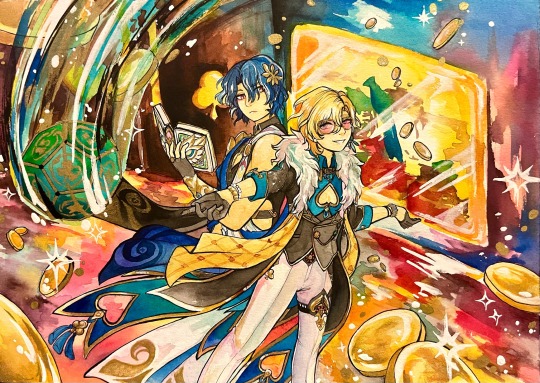
Golden Hour (+ lineart below cut)
I took a picture of the lines for once and did some basic crappy photo editing on my phone, so you could probably print this out and use it as a coloring page or something if you so wish lol. Do with it what you will.
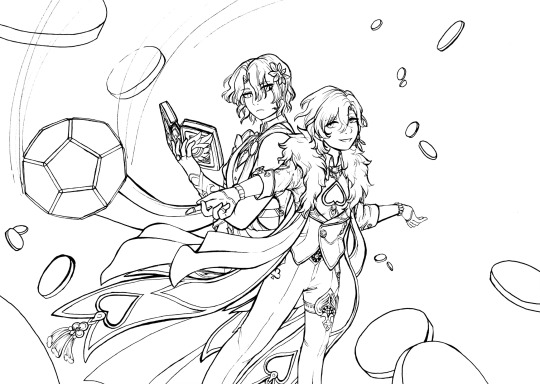
#honkai star rail#dr ratio#veritas ratio#aventurine#aventurine hsr#cherallart#as you can see i forgor i wanted to draw his glasses til like. last second#i can’t believe it’s been like 2 whole months since I last did a whole like. watercolor illustration#part of that’s been bc I’ve been having a bit of a rough semester bc adhd med issues (which are resolved now)#but I really wanted to draw aventurine and ratio. my boys#i’ve been LOVING penacony so far so I needed to get something nice out#anyway I did this while my s/o and I alternated between reading a 500 pg long history book out lout to each other#it’s called ‘the inheritance of rome’ and kinda covers what happened after the collapse of the western roman empire#and tries to identify and explain all the cultural echoes and reverberations and transformations that rose from its ashes#throughout europe north africa and the middle east. anyway it’s super interesting and I highly recommend it#the late antique period is not something often covered/talked abt in public ed hist classes. at least not when I was goin through em#or the transitory period between it and the early medieval period at least#i still got 150 pages left and a final paper due on it in like 4 days but it’s only a 5 pg minimum and I’m a wordy bitch so#i think i can make it#anyway back to that I go
96 notes
·
View notes
Text

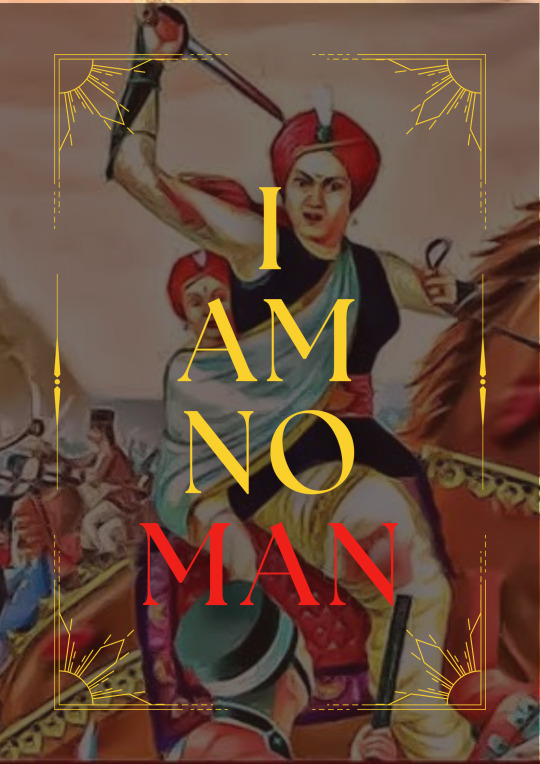
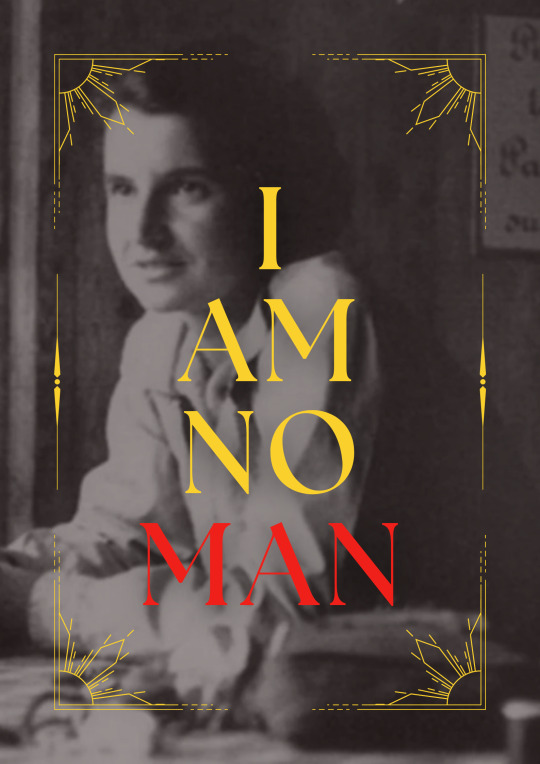



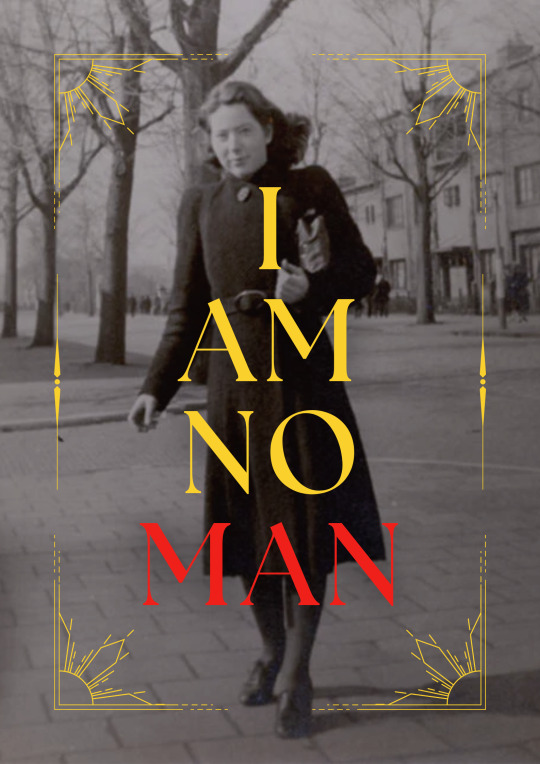

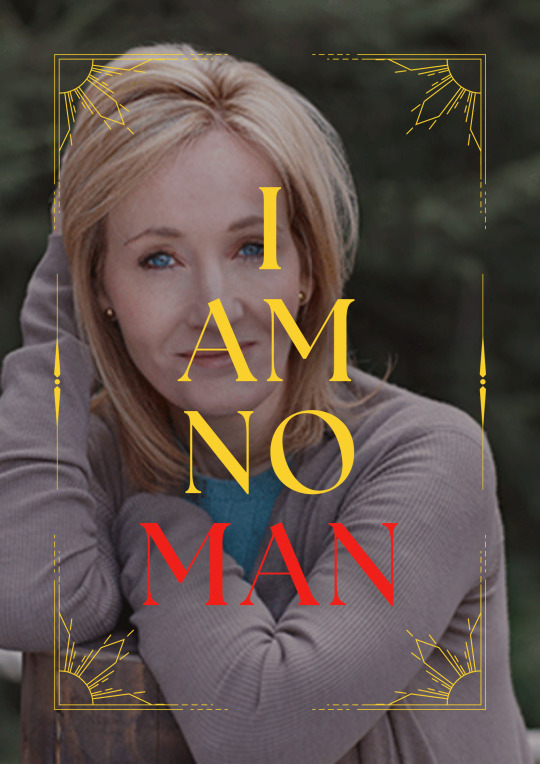
Throughout history, women have left an undeniable impact on society with their hard work, creativity, and dedication to progress. Unfortunately, their accomplishments have often gone unnoticed, been undervalued, or even stolen. Despite these challenges, brave women of today continue to push boundaries, break barriers, and pave the way for a more fair and equal world. It's our duty to keep going, so that future generations of women can inherit a kinder, more just, and supportive world. By following in the footsteps of the incredible women who came before us, we can create a world where every woman can flourish and succeed, and where their contributions are recognized and celebrated.
Joan of Arc is a patron saint of France, honored as a defender of the French nation for her role in the siege of Orléans and her insistence on the coronation of Charles VII of France during the Hundred Years' War. Claiming to be acting under divine guidance, she became a military leader who transcended gender roles and gained recognition as a savior of France. She was put on trial by Bishop Pierre Cauchon on accusations of heresy, which included blaspheming by wearing men's clothes, acting upon visions that were demonic, and refusing to submit her words and deeds to the judgment of the church. She was declared guilty and burned at the stake on 30 May 1431, aged about nineteen.
Rani Lakshmibai was the Maharani consort of the princely state of Jhansi from 1843 to 1853. She was one of the leading figures in the Indian Rebellion of 1857 became a symbol of resistance to the British rule in India for Indian nationalists. When the Maharaja died in 1853, the British East India Company under Governor-General Lord Dalhousie refused to recognize the claim of his adpoted heir and annexed Jhansi under the Doctrine of Lapse. She rode into battle with her infant son strapped to her back, and died in June 1858 after being mortally wounded during the British counterattack at Gwalior.
Rosalind Franklin was a British chemist and X-ray crystallographer whose work was instrumental in the discovery of the structure of DNA. Her contributions were largely overlooked by her male colleagues, James Watson and Francis Crick, who used her data without her permission or acknowledgement. This theft of her intellectual property and erasure of her contributions is a prime example of the systemic sexism that has historically plagued the scientific community.
Hedy Lamarr was an Austrian-American actress and inventor who co-invented a frequency-hopping spread spectrum technology during World War II that was used to guide torpedoes. However, her contributions were largely ignored and dismissed by male engineers and the military at the time. It was only later in life that she received recognition for her scientific achievements.
Emma Weyant is an American competitive swimmer. She was the US national champion at the individual medley. She qualified for the 2020 Olympic Games in the 400m individual medley and won the silver medal in this event. Weyant finished second in the 500-yard freestyle at the 2022 NCAA Division I Women's Swimming and Diving Championships. She was beaten by William (Lia) Thomas, a fetishist, who when competing as a member of the Penn men's team, which was 2018-19, ranked 554th in the 200 freestyle, 65th in the 500 freestyle and 32nd in the 1650 freestyle. Weyant is the fastest swimmer in the 500-yard freestyle and had her position stolen by a man.
Maryna Viazovska is a Ukrainian mathematician who made a breakthrough in sphere packing, solving the centuries-old mathematical problem known as the densest packing of spheres in dimensions 8 and 24. She was awarded the Fields Medal in July 2022, making her the second woman (after Maryam Mirzakhani), the second person born in the Ukrainian SSR and the first with a degree from a Ukrainian university to ever receive it.
Hannie Schaft was a Dutch resistance fighter during World War II who played a crucial role in the resistance movement against Nazi occupation. Schaft was a former university student who dropped out because she refused to sign a pledge of loyalty to Germany. Nazis arrested and killed her in 1945, just three weeks before the war ended in Europe. According to lore, Schaft’s last words were, “I’m a better shot,” after initially only being wounded by her executioner.
Shakuntala Devi was an Indian mathematician and mental calculator who was known as the "Human Computer" for her exceptional ability to perform complex mathematical calculations in her head. Her extraordinary abilities earned her a place in the 1982 Guinness Book of Records. Her lesser known achievement is that in 1977 she wrote what is considered to be the first book in India on homosexuality titled “The World of Homosexuals.”
J. K. Rowling is a British author and philanthropist. She wrote Harry Potter, a seven-volume children's fantasy series published from 1997 to 2007. Known for her philanthropy, she was doxxed and harassed after coming out with support for women's and gay rights in 2020. Rowling secretly donated hundreds of thousands of pounds to save 100 female lawyers and their families facing murder in Afghanistan. In 2022, she funded a women's only rape shelter in Edinburgh.
#this post was inspired by me being absolutely sick of trans activists claiming that joan of arc/rani lakshmibai/insert literally any other#strong woman#is actually a trans man#they were no man at all#women have been brave and strong and amazing throughout history#and they still are#if only you'd get your head out of your ass to take a look#radical feminism#radblr#terf#trans#misogny#i am no man
690 notes
·
View notes
Text
chat wouldnt this mean bunny is conventionally attractive or

#richard called bunny handsome 3 times throughout the whole book btw#i counted#and we all know how much of a reliable narrator richard can be!#the secret history#tsh#richard papen#bunny corcoran
67 notes
·
View notes
Text
Talking to a friend today about how long polygamy lasted in China and I thought, "Huh, that seems like a really long time" (not officially ended until 1940s) but then I had a second thought, "Marriage was really locked in for a long time in England/most of Europe" and maybe that is the stranger thing. Divorce was nearly impossible and polygamy was illegal for a very long time, meaning that death was the only release from marriage. And I guess a lot of people died early, but that still seems wild. Make one decision in your early twenties and then you have to live with it essentially forever.
Then I started thinking to myself, alternative history where polygamy was normal and Henry VIII married all his wives at once. Would that make things better or worse?
#henry viii#historical fiction#I cannot rave enough about no fault divorce btw#best thing invented and reinvented throughout history#always feel better about a society when I learn it has no fault divorce#history#but anyway if a king in a poly country didn't have a boy by the queen he just married more women#who knows if that solved problems or just made more#and it seems sensible at least for royalty#Like if having an heir of your body is the primary goal#not that it ought to be the primary goal but you know#adjust the wives ages so they were all around the same age#except Catherine of Aragon she is the eldest
40 notes
·
View notes
Text
Can't stop thinking of the tragedy of agents of shield and how yeah you can find your found family in a spy organisation but due to the nature of the work it's almost always bound to end in tragedy.
Daisy connected with Ward and he used her and betrayed her.
Fitz was her family and friend for 4 seasons only to end up using and betraying her and dying without any resolution, unlike Ward who she at least got closure with via shooting him.
Simmons was one of the people she trusted most for 4 and a half seasons, "us against the world" until the trauma warped Simmons to the point she could only focus on Fitz and would warp and justify anything to continue loving him. And unlike Fitz she didn't die so there was just this undercurrent for the rest of the show like I still love you and would die for you but I can't trust you the same anymore because I know you would take your husband's side no matter what he did to me. Sometimes it's just the two of us and it's like nothing's changed and other times you're selfish and self centered and willing to sacrifice everyone around you for Fitz. I want it to be us against the world but it isn't anymore. You chose and so even though I love you I need to move on.
Coulson loved Daisy so much. They were the central relationship of the show. But he died, and he's gone and it wasn't fully his choice but it's still one more original team member she's lost.
And then there's May. The final original member, the one Daisy had the hardest time connecting with initially. And now it's just the two of them. May stood by her and May died protecting her and May came back and is still there, just a phone call away. Daisy is off in space, doing what she does best in the face of a lifetime of suffering. She's fighting the good fight and helping people who need it and she's got a partner and a sister who she can trust and with no bad blood remaining.
But if they go back to earth for a pit stop or homesickness or for any other reason, she'll have May waiting for her. Daisy went from alone to the one on her team now with the most roots, a mother and a brother waiting for her every time she comes home to earth. Maybe four out of five times putting your hope and found family heart into your shady spy organisation coworkers ends in tragedy. But maybe that one time it doesn't makes it all worth it.
#Aos#Aos rambles#Daisy Johnson#As bittersweet as the ending was it makes me so happy#If she and sousa have a kid not only is that kid going to grow up with kora as an aunt#and an understanding of their biological family history#But they'll also have May for a grandmother mack as an uncle two great grandparents and all of shield knowing their mom as a hero#Throughout all the tragedy she made a legacy to be proud of
114 notes
·
View notes